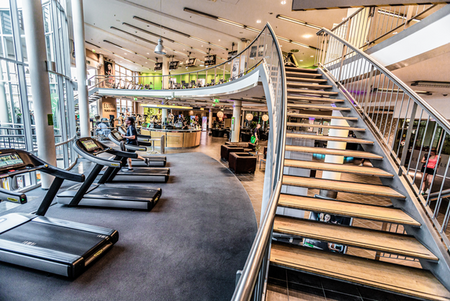Revenues decreased by 13% to GBP 511.4 million (approximately EUR 610 million) in the financial year 2012/13. One reason for the decreased revenues is the reduced club portfolio of 335 clubs at the end of 2013 as compared to 405 clubs one year before – 40 franchise clubs in the Middle East are not included in those figures. As a consequence, membership dropped from 1.07 million to 0.92 million. According to the recent EuropeActive report “European Health & Fitness Market”, Fitness First with revenues of EUR 247 million in German and the United Kingdom in 2013 ranks sixth among the European operators. In terms of members, it comes in fifth with its 454.000 members in Europe. However, also the company’s EBITDA margin decreased to 15%, which was 3 pp less than in the previous year. At the same time, Fitness First was able to increase the utilisation of its capacity: On average, 2,734 members train in each of the company’s clubs. This is a 3% increase in comparison to the year 2011/12. In addition, revenues per member also went up 2% to GBP 558.30 (approximately EUR 665), which is equivalent to a monthly net price of GBP 46.52 (EUR 55).
| Year | 2013 | 2012 |
|---|---|---|
| Number of clubs* | 335 | 405 |
| Membership (million)* | 0.916 | 1.073 |
| Revenue (EURm) | 511.4 | 588.1 |
| Revenue growth | -13.00% | -3.30% |
| Adjusted EBITDA (EURm) | 78.2 | 106.2 |
| Adjusted Operating Profit (EURm) | 30.1 | 54.9 |
| EBITDA Margin | 15% | 18% |
| Operating Profit Margin | 6% | 9% |
| Members per Club | 2,734.33 | 2,649.38 |
| Revenue per Member (EUR) | 558.30 | 548.09 |
| Revenues per Member and Month (EUR) | 46.52 | 45.67 |
*at balance sheet date (31 October 2013)
“A few years ago we began a journey aimed at repositioning the Fitness First brand as the recognised fitness industry leader in every market we operate”, commented Andy Cosslet, CEO at Fitness First. Besides the sale of its complete operations in France, Italy and Spain as well as the BeNeLux countries, the company also divested from clubs in Germany, Great Britain and Australia in order to enhance its performance. The measures in Germany show its first results: Revenues increased by 4% to GBP 125 million (approximately EUR 149 million) and retention levels are the highest in the group with 70%. In the United Kingdom, operational figures improved during the first five months of 2014 as compared to the previous year – new joiners by 15% and leavers by 12.5%. As a result the number of members increased by 10,000.
The geographic realignment allows the operator to better utilize the huge potential of growing markets like Asia where penetration is still comparatively low. In Asia, Fitness First reports a revenue increase by 9.8% to GBP 136 million (approximately EUR 162 million) and an adjusted operating profit of GBP 20.5 million (approximately EUR 24.5 million) which contributes 68 % to the group’s total figure after growing by even 14.5%. In April, according to press information Fitness First announced to invest GBP 83 (approximately EUR 100 million) in the south-east Asian region. Thereof, almost GBP 60 million (ca. EUR 72 million) shall be used to open 50 new clubs. This would increase the presence in the region by 60%. The remainder shall be spent for the refurbishment of existing clubs.
To strengthen its position also in the more mature markets, the company proceeds to change its brand image. In 2013 an amount of GBP 75.3 million (approximately EUR 89 million) has been invested in gym concepts, major upgrades to existing clubs in the UK and Australia and seven club openings pre-dominantly in Southeast Asia. For 2014, GBP 100 million have been assigned to elevate 108 clubs to the new brand positioning including club design and the improvement of the customer service focus. On the operational side, the corporate identity has been enhanced with a new design which has so far been implemented in the UK, Australia and Asia comprising also the launch of a new website. Fitness First reports a positive impact of those measures on the local operational figures. Furthermore, the operator launched two special interest concepts in order to expand its target group: A clubs offering short group workout sessions with six zones of different intensity opened in Sidney under branded “The Zone”; in London, “BEAT” offers heart rate based training in a micro-gym format.
Text: edelhelfer
Source: Fitness First, standard.co.uk
Pictures: Fitness First





